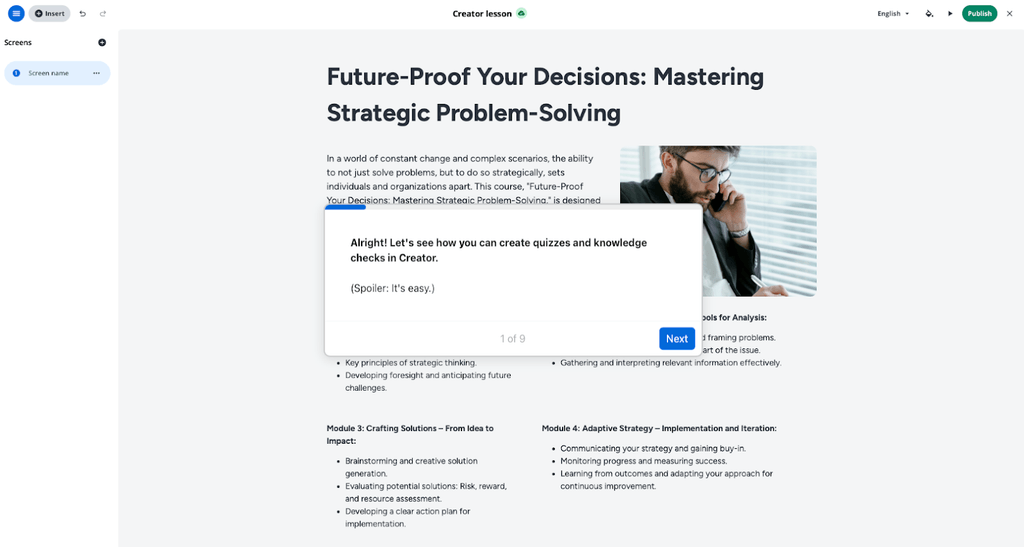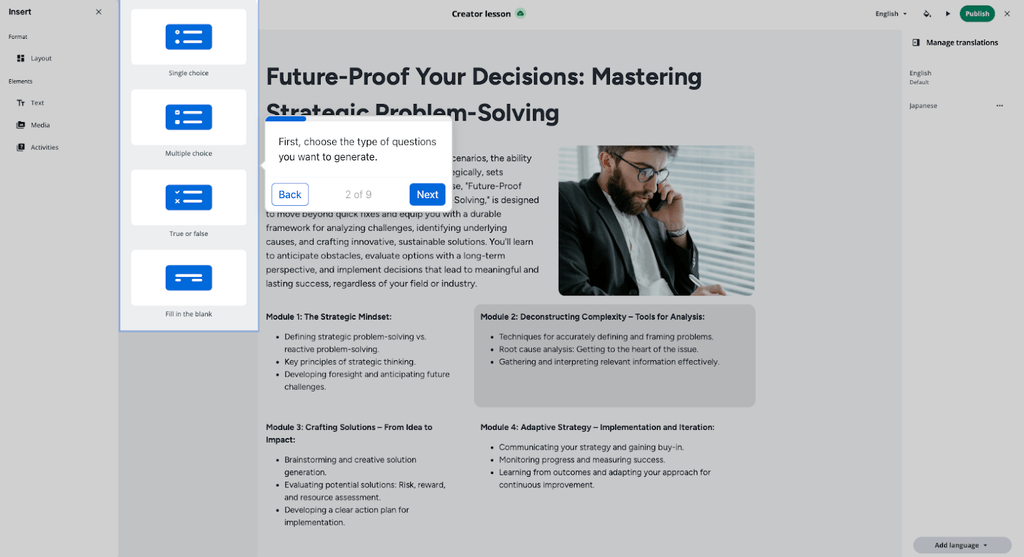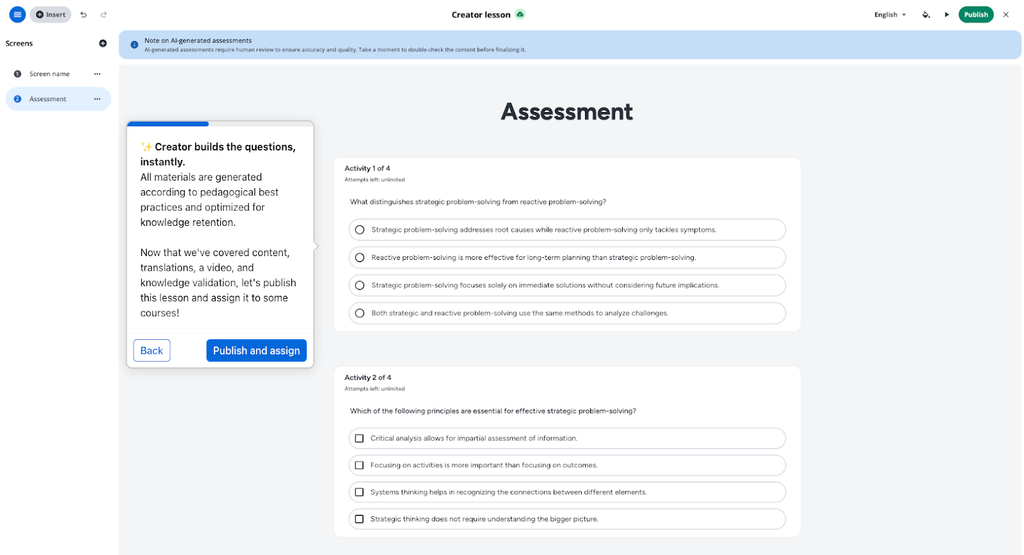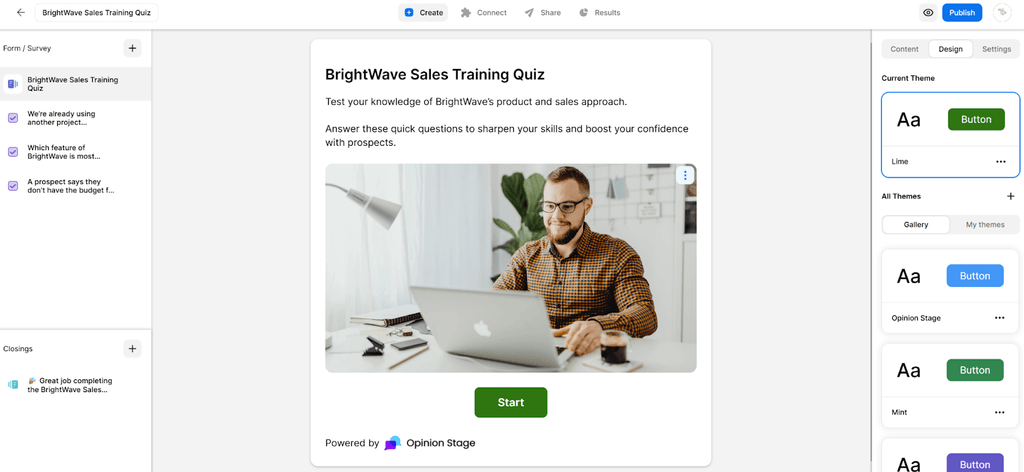10 Sales training ideas to boost reps confidence and results
Think about the last time a prospect surprised your team with a tough objection, an unexpected industry question, or a demand for ROI proof. Did your reps handle it with confidence, or did they stumble?
The truth is, selling today isn’t just about charm. It’s about preparation, adaptability, and continuous learning. That’s why consistent, engaging training is essential for every sales team.
Best 10 sales training ideas to boost your team’s performance
1. Onboarding for new sales reps
Getting new sales reps started on the right foot can make a huge difference for them and your business. Effective employee onboarding helps reps feel more supported, understand their role, and sell with confidence.
A good program guides them through the basics at a comfortable pace, includes interactive content that’s easy to remember, and gives them opportunities to connect with teammates and mentors.
Tools like Docebo simplify this process. Docebo suggests the right learning paths using AI recommendations, tracks progress, and adds fun stuff like gamification and social collaboration to keep reps engaged.
When sales reps sign into Docebo, they’re greeted by a fully branded, role-specific page. There’s no need to dig around because the homepage highlights only what they need (onboarding modules, key resources, and sales playbooks).

Docebo’s AI recommendation engine suggests the right courses to start with, and the learning path is adaptive. As the rep progresses, Docebo automatically adjusts, surfacing the next best piece of content.
And they can access this content on web, iOS, or Android devices, keeping learning consistent whether in the office or on the go. Plus, Docebo has flexible learning formats, including microlearning, allowing reps to complete quick modules between calls.
To reinforce knowledge, reps can play trivia-style games on product features or objection handling. Points, badges, and leaderboards sprinkle in a little bit of friendly competition, adding fun while building confidence.

Reps can also post questions for subject matter experts, share client calls recordings or draft pitch decks with peers for feedback. Not to mention, they can watch user-generated videos from top performers, learning best practices directly from colleagues, fostering knowledge sharing and collaborative learning.

As they continue learning, AI pushes timely resources like quick refresher videos before a new product launch, or a competitive battle card when new market intel is uploaded. Pages are completely configurable so admins can spotlight evolving priorities like quarterly sales initiatives.
Finally, Docebo allows admins to track progress across onboarding modules, certifications, and sales enablement training. Managers can see analytics on completion rates, so they can better assess skill gaps, and knowledge retention. On the flip side, reps receive nudges if they’re falling behind, with recommendations to relevant courses, ensuring accountability.

The end result? A sales rep who’s not just onboarded but continuously enabled, equipped with the right skills, knowledge, and confidence to drive revenue faster.
Because at the end of the day, onboarding doesn’t just teach skills. It keeps sales managers motivated and even cuts down on administrative work for managers. In other words, everyone wins.
2. Product knowledge trivia quizzes
Educational trivia quizzes are a simple and powerful way to make training more active and engaging. Instead of passively reading or listening, reps get to test what they know, spot gaps, and reinforce key concepts.
You can use trivia quizzes in many areas of sales training. From building product knowledge to strengthening compliance training, sharpening industry knowledge, or even competitive positioning.
Trivia quizzes are one of the best ways to build product knowledge. The more familiar your reps are with your product, the easier it is for them to explain value, highlight use cases, and answer tough sales questions from customers with confidence. A well-designed quiz doesn’t just test knowledge; it makes learning interactive, reinforces key information, and keeps employees engaged throughout the process. For example, you can build short quizzes around feature launches or updates to ensure your team remembers what matters most.
These quizzes are also highly effective for compliance training. Rules and policies can feel overwhelming when presented in static documents, but interactive quizzes turn them into memorable learning experiences. Reps can review real-world scenarios, test their understanding of regulations, and get immediate feedback when they make mistakes. This helps employees learn and retain compliance requirements, reducing risk while making sure your team feels confident applying the rules in practice.
To make quizzes part of everyday sales training, you’ll need tools that simplify the process. Platforms like Docebo and Opinion Stage let you create quizzes, while also making it easy to share them with your team and track results.
Docebo Learning Management System
With Creator, Docebo’s AI content creation tool, you can create quizzes and assessments.

To generate quizzes or assessments, you start by choosing the types of questions you want the quiz to have—single choice, multiple choice, True or False, fill in the blank.

Then you select the number of questions you want, and based on your content, Creator generates the questions for you.

All materials are generated according to pedagogical best practices and optimized for knowledge retention. You can also edit and review the questions as needed. And you can translate them into different languages.
Opinion Stage quiz maker
Opinion Stage is a top-rated quiz maker that can help you create interactive and fun knowledge quizzes in under a minute. Besides quizzes, the platform also offers conversational and engaging surveys, forms, and polls.
Make training memorable by adding images and videos that give context and help explain key concepts. The Skip logic feature ensures each sales rep gets a personalized path, focusing on the areas where they need the most improvement.
You can also customize the look and feel of every quiz by adjusting themes, colors, and branding so your training materials feel polished and aligned with your business.

Once your quizzes are ready, you can share them anywhere: inside your LMS, embedded on your website, or through a simple link. Opinion Stage also includes built-in analytics to track progress in real time, spot knowledge gaps, and see exactly where your team is excelling or needs reinforcement.
3. Role-playing scenarios
One of the most effective sales training ideas is to prepare reps for real conversations by practicing them in a safe space first. That’s where role-plays come in.
Acting out different scenarios, like a discovery call, product demo, or even an initial sales prospecting outreach, works best when supported by well-prepared training materials. Developing scripts, sample objections, or scenario guides gives reps a clear starting point and ensures everyone is practicing with the same standards in mind.
To prepare reps for real-world situations, it’s always a good idea to create “curveball” scenarios, like a potential customer who’s short on time or one who challenges every feature.
Role-plays work best when they include feedback. Managers and peers can share input on the spot to help reps improve as they go. A great way to extend the learning is to record sessions so reps can review their performance and track progress over time. To keep things fresh, rotate roles: have one rep sell, another play the customer, and a third observe and give comments.
4. Sales pitch workshops
Every sales rep needs a strong pitch. But the best pitches aren’t one-size-fits-all; they’re tailored to the customer.
Sales pitch workshops give your team the space to practice building and delivering messages that resonate with different buyer personas and industries.
In these sessions, reps can work on crafting pitches that highlight your product’s value. For example, a pitch for a tech lead might focus on integrations and performance, while a pitch for an executive might stress ROI and business impact.
Workshops are also a great time to focus on delivery. Tone, pacing, and body language matter just as much as the words themselves, so reps should refine not only what they say, but how they say it.
5. Objection handling sessions
Hearing “no” is part of every sales rep’s day. But the best reps know how to turn those situations into opportunities. That’s why objection handling training is so valuable.
It helps your team anticipate common pushbacks, stay calm under pressure, and respond in ways that keep the conversation moving forward.
Give reps examples of actual objections your team hears: things like “It’s too expensive,” “We don’t have time,” or “We’re already using another tool.”
Another excellent way to train salespeople to handle objections is by following the master–apprentice model. Johannes Karjula, CEO of Trustmary, says it’s the fastest way to prepare sales reps for complex scenarios.
“In this model, a junior salesperson works for the first few months as a close partner to a senior salesperson. They replicate everything the more experienced salesperson does and receive immediate feedback through the results.”
Objections don’t just happen on sales calls. Your customer support team also encounters them through channels like live chat support, making it important to train support reps on how to recognize opportunities and handle objections with the same skill as sales. Work through these examples together, have reps practice their responses, and repeat until it feels natural.
The goal isn’t to memorize a script. It’s to help reps build confidence, empathy, and adaptability.
6. Sales challenges
Another sales training idea is to add a little friendly competition, which can go a long way in motivating a sales team. Turning everyday tasks like making calls, booking demos, or closing deals into challenges is a simple form of gamified sales training that makes learning more engaging.
The idea is simple: set a clear metric through effective goal setting, give reps a time frame, and track progress in real time.
You might run a “demo day” challenge to see who can book the most demos in 24 hours, create a weekly leaderboard for calls made, or track who generates the most engagement on social media. These kinds of contests keep things fun while encouraging consistent activity.
Challenges also give managers a chance to celebrate wins publicly. Recognizing top performers, whether through shoutouts, badges, or small rewards, creates momentum for the whole team.
7. Negotiation practice
Sales negotiation can make or break a deal. Apart from getting the best terms, reps have to learn how to find common ground that keeps both sides happy.
In online training, you can run mock scenarios where reps learn to balance the value proposition with trust.
For example, practice what happens when a customer pushes for a discount, asks for extra features, or compares your product to a cheaper competitor. These exercises help reps test strategies, find the right words, and stay calm under pressure.
The real benefit is confidence. When reps have already worked through tough situations in practice, they’re less likely to freeze or give in too quickly in real conversations.
8. Win/loss analysis sessions
Every deal tells a story, whether it ended in a win or a loss. Win/loss analysis sessions help your team dig into those stories and uncover what’s really working in your sales process (and what isn’t).
Pick a few recent deals, review what happened step by step, and talk openly about the results.
For wins, highlight what made the difference, like a strong demo or quick follow-up.
For losses, look at where things slipped: maybe the timing was off, the pitch didn’t land, or the competition had an edge.
The key is turning insights into action. Over time, these sessions build a playbook of best sales practices that your whole team can use to close more deals.
9. Storytelling training
Facts and features are important, but stories are what people remember. That’s why running storytelling workshops to teach reps how to tell great stories is an effective sales training idea.
Focus on turning customer success stories into simple, engaging narratives. Instead of just saying “our product saves time,” reps can share how a specific client cut their onboarding process in half and used that time to focus on growth. Stories like that create an emotional connection, especially when they feature clients in a similar niche or of a similar size. Relatable examples help prospects see themselves in the story and better understand how your product can solve their challenges.
Storytelling training also helps reps build rapport. When they can weave in relatable examples or anecdotes, conversations feel less like a sales pitch and more like a natural exchange.
10. Soft skills enhancement training
Emotional intelligence, active listening, and empathy are crucial in building trust and lasting relationships with clients.
Training your team on soft skills can make a real difference. Workshops on emotional intelligence can also teach them how to read the room, adapt their tone, and respond with empathy instead of pressure.
The result? Conversations feel more genuine, prospects feel understood, and deals move forward more smoothly.
Training as a part of your sales enablement
Sales enablement is all about giving your team what they need to close deals faster. But here’s the truth: reps need more than just information — they need continuous learning that builds skills and adaptability.
With Docebo, sales training becomes smarter, smoother, and more impactful. Instead of generic, one-size-fits-all programs, Docebo delivers self-paced learning that matches each rep’s role, experience, and goals.
The result? Training becomes more than a checkbox. It becomes a data-driven part of your enablement strategy and directly contributes to your revenue growth.
We hope these sales training ideas give you fresh inspiration to empower your team, sharpen their skills, and set them up for long-term success. After all, when your reps win, your business wins too.